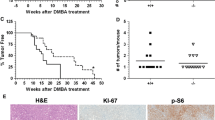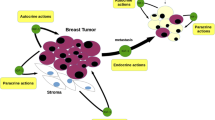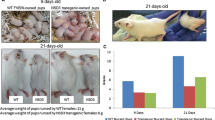Abstract
Insulin-like growth factor-I and -II (IGF-I and IGF-II) and/or the type I insulin-like growth factor receptor (IGF-IR) have been implicated in a number of human tumors including breast cancer. However, despite being implicated in breast cancer for approximately 25 years and given that transgenic technology has been available for about the same period of time, it is surprising that transgenic mice overexpressing the IGF-IR in the mammary gland have only recently been characterized. This review will describe the effects of IGF-IR overexpression on mammary ductal morphogenesis and mammary tumorigenesis in the two available transgenic models.
Similar content being viewed by others
Abbreviations
- CD8-IGFIR:
-
transgenic mice expressing constitutively active IGF-IR in mammary epithelial cells
- EMT:
-
epithelial to mesenchymal transition
- ER:
-
estrogen receptor
- IGF:
-
insulin-like growth factor
- IGFBP:
-
insulin-like growth factor binding protein
- IGF-IR:
-
type I insulin-like growth factor receptor
- IRS:
-
insulin receptor substrate
- MMTV:
-
mammary tumor virus promoter
- MTB-IGFIR:
-
bi-transgenic mice expressing the full length human IGF-IR cDNA in the mammary epithelial cells in a doxycycline-inducible manner
- PR:
-
progesterone receptor
- RM11A:
-
primary mammary tumor cells derived from a MTB-IGFIR mammary tumor
- rtTA:
-
reverse tetracycline transactivator
- TEB:
-
terminal end bud
- TRE:
-
tetracycline responsive element
- WAP:
-
whey acid protein
References
Furstenberger G, Morant R, Senn HJ. Insulin-like growth factors and breast cancer. Onkologie 2003;26:290–4. doi:10.1159/000071627.
Helle SI. The insulin-like growth factor system in advanced breast cancer. Best Pract Res Clin Endocrinol Metab. 2004;18:67–79. doi:10.1016/S1521-690X(03)00045-9.
Koda M, Przystupa W, Jarzabek K, Wincewicz A, Kanczuga-Koda L, Tomaszewski J, et al. Expression of insulin-like growth factor-I receptor, estrogen receptor alpha, Bcl-2 and Bax proteins in human breast cancer. Oncol Rep. 2005;14:93–8.
Maor S, Yosepovich A, Papa MZ, Yarden RI, Mayer D, Friedman E, et al. Elevated insulin-like growth factor-I receptor (IGF-IR) levels in primary breast tumors associated with BRCA1 mutations. Cancer Lett. 2007;257:236–43.
Nielsen TO, Andrews HN, Cheang M, Kucab JE, Hsu FD, Ragaz J, et al. Expression of the insulin-like growth factor I receptor and urokinase plasminogen activator in breast cancer is associated with poor survival: potential for intervention with 17-allylamino geldanamycin. Cancer Res. 2004;64:286–91. doi:10.1158/0008-5472.CAN-03-1242.
Surmacz E, Guvakova MA, Nolan MK, Nicosia RF, Sciacca L. Type I insulin-like growth factor receptor function in breast cancer. Breast Cancer Res Treat. 1998;47:255–67. doi:10.1023/A:1005907101686.
Liu JP, Baker J, Perkins AS, Robertson EJ, Efstratiadis A. Mice carrying null mutations of the genes encoding insulin-like growth factor I (Igf-1) and type I IGF receptor (Igf1r). Cell 1993;75:59–72.
Bonnette SG, Hadsell DL. Targeted disruption of the IGF-I receptor gene decreases cellular proliferation in mammary terminal end buds. Endocrinology 2001;142:4937–45. doi:10.1210/en.142.11.4937.
Stewart TA, Pattengale PK, Leder P. Spontaneous mammary adenocarcinomas in transgenic mice that carry and express MTV/myc fusion genes. Cell 1984;38:627–37. doi:10.1016/0092-8674(84)90257-5.
Muller WJ, Sinn E, Pattengale PK, Wallace R, Leder P. Single-step induction of mammary adenocarcinoma in transgenic mice bearing the activated c-neu oncogene. Cell 1988;54:105–15. doi:10.1016/0092-8674(88)90184-5.
Wang TC, Cardiff RD, Zukerberg L, Lees E, Arnold A, Schmidt EV. Mammary hyperplasia and carcinoma in MMTV-cyclin D1 transgenic mice. Nature 1994;369:669–71. doi:10.1038/369669a0.
LeRoith D, Neuenschwander S, Wood TL, Henninghausen L. Insulin-like growth factor-I and insulin-like growth factor binding protein-3 inhibit involution of the mammary gland following lactation: studies in transgenic mice. Prog Growth Factor Res. 1995;6:433–6. doi:10.1016/0955-2235(96)00009-9.
Moorehead RA, Fata JE, Johnson MB, Khokha R. Inhibition of mammary epithelial apoptosis and sustained phosphorylation of Akt/PKB in MMTV-IGF-II transgenic mice. Cell Death Differ. 2001;8:16–29. doi:10.1038/sj.cdd.4400762.
Pravtcheva DD, Wise TL. Metastasizing mammary carcinomas in H19 enhancers-Igf2 transgenic mice. J Exp Zool. 1998;281:43–57. doi:10.1002/(SICI)1097-010X(19980501)281:1<43::AID-JEZ7>3.0.CO;2-C.
Bates P, Fisher R, Ward A, Richardson L, Hill DJ, Graham CF. Mammary cancer in transgenic mice expressing insulin-like growth factor II (IGF-II). Br J Cancer. 1995;72:1189–93.
Hadsell DL, Greenberg NM, Fligger JM, Baumrucker CR, Rosen JM. Targeted expression of des(1-3) human insulin-like growth factor I (IGF-I) in transgenic mice influences mammary gland development and IGF-binding protein expression. Endocrinology 1997;137:321–30. doi:10.1210/en.137.1.321.
Neuenschwander S, Schwartz A, Wood TL, Roberts CT Jr, Henninghausen L. Involution of the lactating mammary gland is inhibited by the IGF system in a transgenic mouse model. J Clin Invest. 1996;97:2225–32. doi:10.1172/JCI118663.
de Ostrovich KK, Lambertz I, Colby JK, Tian J, Rundhaug JE, Johnston D, et al. Paracrine overexpression of insulin-like growth factor-1 enhances mammary tumorigenesis in vivo. Am J Pathol. 2008;173:824–34. doi:10.2353/ajpath.2008.071005.
Hadsell DL, Torres DT, Lawrence NA, George J, Parlow AF, Lee AV, et al. Overexpression of des(1-3) insulin-like growth factor 1 in the mammary glands of transgenic mice delays the loss of milk production with prolonged lactation. Biol Reprod. 2005;73:1116–25. doi:10.1095/biolreprod.105.043992.
Su HY, Cheng WT. Increased milk yield in transgenic mice expressing insulin-like growth factor 1. Anim Biotechnol. 2004;15:9–19. doi:10.1081/ABIO-120027521.
Hadsell DL, Alexeenko T, Klimentidis Y, Torres D, Lee AV. Inability of overexpressed des(1-3)human insulin-like growth factor I (IGF-I) to inhibit forced mammary gland involution is associated with decreased expression of IGF signaling molecules. Endocrinology 2001;142:1479–88. doi:10.1210/en.142.4.1479.
Hadsell DL, Murphy KL, Bonnette SG, Reece N, Laucirica R, Rosen JM. Cooperative interaction between mutant p53 and des(1-3)IGF-I accelerates mammary tumorigenesis. Oncogene 2000;19:889–98. doi:10.1038/sj.onc.1203386.
Burrin DG, Fiorotto ML, Hadsell DL. Transgenic hypersecretion of des(1-3) human insulin-like growth factor I in mouse milk has limited effects on the gastrointestinal tract in suckling pups. J Nutr. 1999;129:51–6.
Weber MS, Boyle PL, Corl BA, Wong EA, Gwazdauskas FC, Akers RM. Expression of ovine insulin-like growth factor-1 (IGF-1) stimulates alveolar bud development in mammary glands of transgenic mice. Endocrine 1998;8:251–9. doi:10.1385/ENDO:8:3:251.
Carboni JM, Lee AV, Hadsell DL, Rowley BR, Lee FY, Bol DK, et al. Tumor development by transgenic expression of a constitutively active insulin-like growth factor I receptor. Cancer Res. 2005;65:3781–7. doi:10.1158/0008-5472.CAN-04-4602.
Gunther EJ, Belka GK, Wertheim GB, Wang J, Hartman JL, Boxer RB, et al. A novel doxycycline-inducible system for the transgenic analysis of mammary gland biology. FASEB J. 2002;16:283–92. doi:10.1096/fj.01-0551com.
Jones RA, Campbell CI, Gunther EJ, Chodosh LA, Petrik JJ, Khokha R, et al. Transgenic overexpression of IGF-IR disrupts mammary ductal morphogenesis and induces tumor formation. Oncogene 2007;26:1636–44. doi:10.1038/sj.onc.1209955.
Jackson-Fisher AJ, Bellinger G, Ramabhadran R, Morris JK, Lee KF, Stern DF. ErbB2 is required for ductal morphogenesis of the mammary gland. Proc Natl Acad Sci USA. 2004;101:17138–43. doi:10.1073/pnas.0407057101.
Mukherjee S, Louie SG, Campbell M, Esserman L, Shyamala G. Ductal growth is impeded in mammary glands of C-neu transgenic mice. Oncogene 2000;19:5982–7. doi:10.1038/sj.onc.1203964.
Sarkisian CJ, Keister BA, Stairs DB, Boxer RB, Moody SE, Chodosh LA. Dose-dependent oncogene-induced senescence in vivo and its evasion during mammary tumorigenesis. Nat Cell Biol. 2007;9:493–505. doi:10.1038/ncb1567.
Vargo-Gogola T, Heckman BM, Gunther EJ, Chodosh LA, Rosen JM. P190-B Rho GTPase-activating protein overexpression disrupts ductal morphogenesis and induces hyperplastic lesions in the developing mammary gland. Mol Endocrinol. 2006;20:1391–405. doi:10.1210/me.2005-0426.
Kim HJ, Litzenburger BC, Cui X, Delgado DA, Grabiner BC, Lin X, et al. Constitutively active type I insulin-like growth factor receptor causes transformation and xenograft growth of immortalized mammary epithelial cells and is accompanied by an epithelial-to-mesenchymal transition mediated by NF-kappaB and snail. Mol Cell Biol. 2007;27:3165–75. doi:10.1128/MCB.01315-06.
Jones RA, Campbell CI, Petrik JJ, Moorehead RA. Characterization of a novel primary mammary tumor cell line reveals that cyclin D1 is regulated by the type I insulin-like growth factor receptor. Mol Cancer Res. 2008;6:819–28. doi:10.1158/1541-7786.MCR-07-2157.
Siegel PM, Ryan ED, Cardiff RD, Muller WJ. Elevated expression of activated forms of Neu/ErbB-2 and ErbB-3 are involved in the induction of mammary tumors in transgenic mice: implications for human breast cancer. EMBO J. 1999;18:2149–64. doi:10.1093/emboj/18.8.2149.
Rubini M, Hongo A, D’Ambrosio C, Baserga R. The IGF-I receptor in mitogenesis and transformation of mouse embryo cells: role of receptor number. Exp Cell Res. 1997;230:284–92. doi:10.1006/excr.1996.3430.
Resnik JL, Reichart DB, Huey K, Webster NJG, Seely BL. Elevated insulin-like growth factor I receptor autophosphorylation and kinase activity in human breast cancer. Cancer Res. 1998;58:1159–64.
Dearth RK, Cui X, Kim HJ, Hadsell DL, Lee AV. Oncogenic transformation by the signaling adaptor proteins insulin receptor substrate (IRS)-1 and IRS-2. Cell Cycle. 2007;6:705–13.
Dearth RK, Cui X, Kim HJ, Kuiatse I, Lawrence NA, Zhang X, et al. Mammary tumorigenesis and metastasis caused by overexpression of insulin receptor substrate 1 (IRS-1) or IRS-2. Mol Cell Biol. 2006;26:9302–14. doi:10.1128/MCB.00260-06.
Jones RA, Campbell CI, Wood GA, Petrik JJ, Moorehead RA. Reversibility and recurrence of IGF-IR-induced mammary tumors. Mol Cell Biol. 2008; submitted.
Moody SE, Sarkisian CJ, Hahn KT, Gunther EJ, Pickup S, Dugan KD, et al. Conditional activation of Neu in the mammary epithelium of transgenic mice results in reversible pulmonary metastasis. Cancer Cell. 2002;2:451–61. doi:10.1016/S1535-6108(02)00212-X.
Moody SE, Perez D, Pan TC, Sarkisian CJ, Portocarrero CP, Sterner CJ, et al. The transcriptional repressor Snail promotes mammary tumor recurrence. Cancer Cell. 2005;8:197–209. doi:10.1016/j.ccr.2005.07.009.
Boxer RB, Jang JW, Sintasath L, Chodosh LA. Lack of sustained regression of c-MYC-induced mammary adenocarcinomas following brief or prolonged MYC inactivation. Cancer Cell. 2004;6:577–86. doi:10.1016/j.ccr.2004.10.013.
Jang JW, Boxer RB, Chodosh LA. Isoform-specific ras activation and oncogene dependence during MYC- and Wnt-induced mammary tumorigenesis. Mol Cell Biol. 2006;26:8109–21. doi:10.1128/MCB.00404-06.
Baum B, Settleman J, Quinlan MP. Transitions between epithelial and mesenchymal states in development and disease. Semin Cell Dev Biol. 2008;19:294–308. doi:10.1016/j.semcdb.2008.02.001.
Thiery JP. Epithelial-mesenchymal transitions in tumour progression. Nat Rev Cancer. 2002;2:442–54. doi:10.1038/nrc822.
Hugo H, Ackland ML, Blick T, Lawrence MG, Clements JA, Williams ED, et al. Epithelial–mesenchymal and mesenchymal–epithelial transitions in carcinoma progression. J Cell Physiol. 2007;213:374–83. doi:10.1002/jcp.21223.
Morali OG, Delmas V, Moore R, Jeanney C, Thiery JP, Larue L. IGF-II induces rapid beta-catenin relocation to the nucleus during epithelium to mesenchyme transition. Oncogene 2001;20:4942–50. doi:10.1038/sj.onc.1204660.
Irie HY, Pearline RV, Grueneberg D, Hsia M, Ravichandran P, Kothari N, et al. Distinct roles of Akt1 and Akt2 in regulating cell migration and epithelial-mesenchymal transition. J Cell Biol. 2005;171:1023–34. doi:10.1083/jcb.200505087.
Yanochko GM, Eckhart W. Type I insulin-like growth factor receptor over-expression induces proliferation and anti-apoptotic signaling in a three-dimensional culture model of breast epithelial cells. Breast Cancer Res. 2006;8:R18. doi:10.1186/bcr1392.
Russo J, Moral R, Balogh GA, Mailo D, Russo IH. The protective role of pregnancy in breast cancer. Breast Cancer Res. 2005;7:131–42. doi:10.1186/bcr1029.
McGregor H, Land CE, Choi K, Tokuoka S, Liu PI, Wakabayashi T, et al. Breast cancer incidence among atomic bomb survivors, Hiroshima and Nagasaki, 1950-69. J Natl Cancer Inst. 1977;59:799–811.
Yang J, Yoshizawa K, Nandi S, Tsubura A. Protective effects of pregnancy and lactation against N-methyl-N-nitrosourea-induced mammary carcinomas in female Lewis rats. Carcinogenesis 1999;20:623–8. doi:10.1093/carcin/20.4.623.
Russo IH, Russo J. Mammary carcinogenesis: role of differentiation in tumor initiation. Surg Pathol. 1994;5:307–26.
Author information
Authors and Affiliations
Corresponding author
Rights and permissions
About this article
Cite this article
Jones, R.A., Moorehead, R.A. The Impact of Transgenic IGF-IR Overexpression on Mammary Development and Tumorigenesis. J Mammary Gland Biol Neoplasia 13, 407–413 (2008). https://doi.org/10.1007/s10911-008-9097-1
Received:
Accepted:
Published:
Issue Date:
DOI: https://doi.org/10.1007/s10911-008-9097-1




